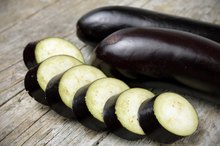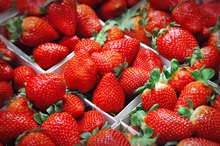What does fact checked mean?
At Healthfully, we strive to deliver objective content that is accurate and up-to-date. Our team periodically reviews articles in order to ensure content quality. The sources cited below consist of evidence from peer-reviewed journals, prominent medical organizations, academic associations, and government data.
The information contained on this site is for informational purposes only, and should not be used as a substitute for the advice of a professional health care provider. Please check with the appropriate physician regarding health questions and concerns. Although we strive to deliver accurate and up-to-date information, no guarantee to that effect is made.
Is Green Tea Bad for Gout?
Gout is a form of arthritis. Its symptoms can be controlled in two main ways: with medication and by following a diet that helps decrease the level of compounds in the body that cause the joints to become painfully inflamed. Health experts recommend green tea for gout sufferers since it is low in the purine compounds that trigger gout attacks and contains a high concentration of antioxidants that suppress inflammation. If you have gout, speak to your doctor about the advantages and disadvantages of drinking green tea.
Gout
Gout is a disorder that occurs when excess uric acid builds up in your joints and tissues and forms urate crystals. The presence of these crystals can cause bouts of fever and extreme joint pain in what is called a gout attack. The joints may also become red and swollen, and bumps may develop just beneath the skin of your feet, legs and arms. Uric acid levels accumulate and result in gout if your body produces too much of the acid or if your kidneys are not functioning properly. You are more likely to develop gout if your family has a history of the disease, if you use certain medications, if you are a man over the age of 40 and if you eat a diet high in purine-containing foods.
- Gout is a disorder that occurs when excess uric acid builds up in your joints and tissues and forms urate crystals.
- Uric acid levels accumulate and result in gout if your body produces too much of the acid or if your kidneys are not functioning properly.
Green Tea Purine Content
Are Lemon Juice and Baking Soda Helpful for Gout?
Learn More
When the body metabolizes purine compounds, uric acid is produced. Health professionals advise people with gout to strictly avoid foods that have a high purine content of between 150 to 825 milligrams of purines for every 100 grams of the food and to limit their use of foods containing 50 to 150 milligrams of purines per 100 grams. Green tea is considered a low-purine food since it contains less than 50 milligrams of purines per 100 grams. People with gout can consume large amounts of low-purine foods without triggering a gout attack.
- When the body metabolizes purine compounds, uric acid is produced.
- Green tea is considered a low-purine food since it contains less than 50 milligrams of purines per 100 grams.
Green Tea Antioxidant Content
Green tea may offer another benefit for gout sufferers -- its high antioxidant concentration may help decrease the joint inflammation and swelling characteristic of gout. Green tea contains a wide variety of antioxidant compounds known as polyphenols, including gallic acid and the catechin compounds epigallocatechin, epicatechin and gallocatechin. According to the University of Maryland Medical Center, taking 250 to 500 milligrams daily of green tea extract or drinking 2 to 4 cups of tea prepared from green tea leaves may help control the symptoms of gout 34. However, more clinical research is needed to determine the effects of long-term green tea use and to set safe dosage ranges.
- Green tea may offer another benefit for gout sufferers -- its high antioxidant concentration may help decrease the joint inflammation and swelling characteristic of gout.
- According to the University of Maryland Medical Center, taking 250 to 500 milligrams daily of green tea extract or drinking 2 to 4 cups of tea prepared from green tea leaves may help control the symptoms of gout 3.
Considerations
Foods That May Cause Joint Pain
Learn More
Green tea is not approved by the U.S. Food and Drug Administration as a safe or effective treatment method for any condition, including gout. Green tea extract supplements are not checked for purity or to verify the quality of their contents. Green tea use can cause dizziness, headaches, vomiting and diarrhea and should be avoided by anyone with a digestive, neurological or cardiovascular disorder. Do not attempt to self-treat gout or any other condition with green tea, and do not use the tea as a substitute for medications your doctor has prescribed.
- Green tea is not approved by the U.S. Food and Drug Administration as a safe or effective treatment method for any condition, including gout.
- Do not attempt to self-treat gout or any other condition with green tea, and do not use the tea as a substitute for medications your doctor has prescribed.
Related Articles
References
- Dialadietitian.org: Diet for Gout
- Memorial Sloan-Kettering Cancer Center: Green Tea
- University of Maryland Medical Center: Gout
- University of Maryland Medical Center: Green Tea
- MayoClinic.com: Gout
- National Institute of Arthritis and Musculoskeletal and Skin Diseases. Gout. Updated April 2016.
- Zhang Y, Chen C, Choi H, et al. Purine-rich foods intake and recurrent gout attacks. Ann Rheum Dis. 2012; 71(9):1448-53. doi:10.1136/annrheumdis-2011-201215
- Fischer E. Ueber die Harnsauer. 1 [On Uric Acid. 1]. Berichte der Deutschen Chemischen Gesellschaft. 1884: 17:328-338. doi:10.1002/cber.18980310304
- Ragab, G., Elshahaly, M., & Bardin, T. (2017). Gout: An old disease in new perspective – A review. Journal of Advanced Research, 8(5), 495–511. doi:10.1016/j.jare.2017.04.008
- Centers for Disease Control and Prevention. Gout. Updated January 28, 2019.
- Zgaga, L., Theodoratou, E., Kyle, J., Farrington, S. M., Agakov, F., Tenesa, A., … Campbell, H. (2012). The Association of Dietary Intake of Purine-Rich Vegetables, Sugar-Sweetened Beverages and Dairy with Plasma Urate, in a Cross-Sectional Study. PLoS ONE, 7(6), e38123. doi:10.1371/journal.pone.0038123
- Choi HK, Gao X, Curhan G. Vitamin C intake and the risk of gout in men: a prospective study. Arch Intern Med. 2009;169(5):502–507. doi:10.1001/archinternmed.2008.606
- Zhang Y, Neogi T, Chen C, Chaisson C, Hunter DJ, Choi HK. Cherry consumption and decreased risk of recurrent gout attacks. Arthritis Rheum. 2012;64(12):4004–4011. doi:10.1002/art.34677
- Arthritis Foundation. Gout Diet: Dos and Don’ts.
- Boban M, Modun D. Uric acid and antioxidant effects of wine. Croat Med J. 2010;51(1):16–22. doi:10.3325/cmj.2010.51.16
- Caliceti C, Calabria D, Roda A, Cicero AFG. Fructose Intake, Serum Uric Acid, and Cardiometabolic Disorders: A Critical Review. Nutrients. 2017;9(4):395. Published 2017 Apr 18. doi:10.3390/nu9040395
- U.S. Department of Health and Human Services and U.S. Department of Agriculture. 2015–2020 Dietary Guidelines for Americans. 8th Edition. Published December 2015.
- U.S. Department of Health and Human Services. Gripped by Gout. NIH News in Health. Published February 2014.
- Kakutani-Hatayama M, Kadoya M, Okazaki H, et al. Nonpharmacological Management of Gout and Hyperuricemia: Hints for Better Lifestyle. Am J Lifestyle Med. 2015;11(4):321–329. Published 2015 Sep 2. doi:10.1177/1559827615601973
Writer Bio
Michelle Kerns writes for a variety of print and online publications and specializes in literature and science topics. She has served as a book columnist since 2008 and is a member of the National Book Critics Circle. Kerns studied English literature and neurology at UC Davis.









